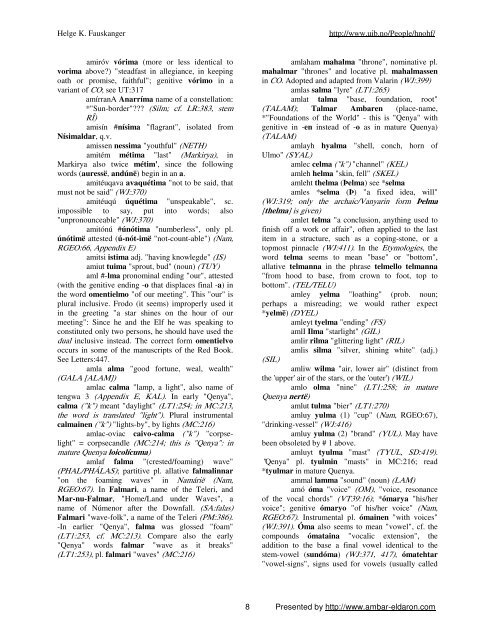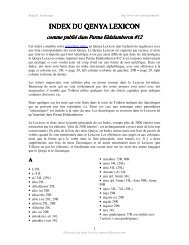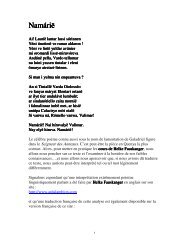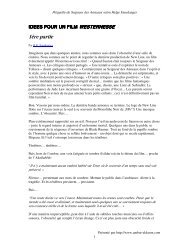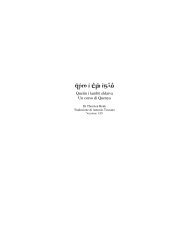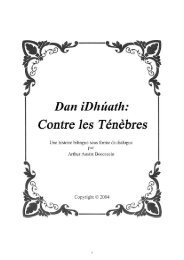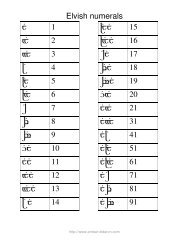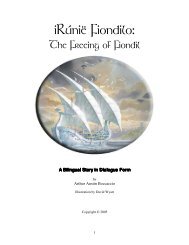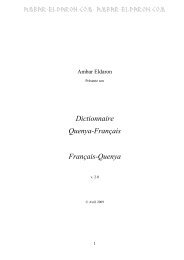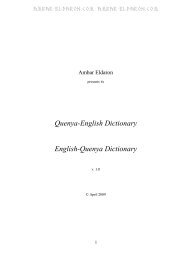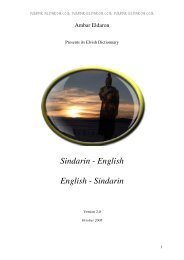Quenya Reverse Wordlist - Ambar Eldaron
Quenya Reverse Wordlist - Ambar Eldaron
Quenya Reverse Wordlist - Ambar Eldaron
Create successful ePaper yourself
Turn your PDF publications into a flip-book with our unique Google optimized e-Paper software.
Helge K. Fauskanger http://www.uib.no/People/hnohf/<br />
amiróv vórima (more or less identical to<br />
vorima above?) "steadfast in allegiance, in keeping<br />
oath or promise, faithful"; genitive vórimo in a<br />
variant of CO; see UT:317<br />
amírranA Anarríma name of a constellation:<br />
*"Sun-border"??? (Silm; cf. LR:383, stem<br />
RÎ)<br />
amisín #nísima "flagrant", isolated from<br />
Nísimaldar, q.v.<br />
amissen nessima "youthful" (NETH)<br />
amitém métima "last" (Markirya), in<br />
Markirya also twice métim', since the following<br />
words (auressë, andúnë) begin in an a.<br />
amitéuqava avaquétima "not to be said, that<br />
must not be said" (WJ:370)<br />
amitéuqú úquétima "unspeakable", sc.<br />
impossible to say, put into words; also<br />
"unpronounceable" (WJ:370)<br />
amitónú #únótima "numberless", only pl.<br />
únótimë attested (ú-nót-imë "not-count-able") (Nam,<br />
RGEO:66, Appendix E)<br />
amitsi istima adj. "having knowlegde" (IS)<br />
amiut tuima "sprout, bud" (noun) (TUY)<br />
aml #-lma pronominal ending "our", attested<br />
(with the genitive ending -o that displaces final -a) in<br />
the word omentielmo "of our meeting". This "our" is<br />
plural inclusive. Frodo (it seems) improperly used it<br />
in the greeting "a star shines on the hour of our<br />
meeting": Since he and the Elf he was speaking to<br />
constituted only two persons, he should have used the<br />
dual inclusive instead. The correct form omentielvo<br />
occurs in some of the manuscripts of the Red Book.<br />
See Letters:447.<br />
amla alma "good fortune, weal, wealth"<br />
(GALA [ALAM])<br />
amlac calma "lamp, a light", also name of<br />
tengwa 3 (Appendix E, KAL). In early "Qenya",<br />
calma ("k") meant "daylight" (LT1:254; in MC:213,<br />
the word is translated "light"). Plural instrumental<br />
calmainen ("k") "lights-by", by lights (MC:216)<br />
amlac-oviac caivo-calma ("k") "corpselight"<br />
= corpsecandle (MC:214; this is "Qenya": in<br />
mature <strong>Quenya</strong> loicolícuma)<br />
amlaf falma "(crested/foaming) wave"<br />
(PHAL/PHÁLAS); partitive pl. allative falmalinnar<br />
"on the foaming waves" in Namárië (Nam,<br />
RGEO:67). In Falmari, a name of the Teleri, and<br />
Mar-nu-Falmar, "Home/Land under Waves", a<br />
name of Númenor after the Downfall. (SA:falas)<br />
Falmari "wave-folk", a name of the Teleri (PM:386).<br />
-In earlier "Qenya", falma was glossed "foam"<br />
(LT1:253, cf. MC:213). Compare also the early<br />
"Qenya" words falmar "wave as it breaks"<br />
(LT1:253), pl. falmari "waves" (MC:216)<br />
8<br />
amlaham mahalma "throne", nominative pl.<br />
mahalmar "thrones" and locative pl. mahalmassen<br />
in CO. Adopted and adapted from Valarin (WJ:399)<br />
amlas salma "lyre" (LT1:265)<br />
amlat talma "base, foundation, root"<br />
(TALAM); Talmar <strong>Ambar</strong>en (place-name,<br />
*"Foundations of the World" - this is "Qenya" with<br />
genitive in -en instead of -o as in mature <strong>Quenya</strong>)<br />
(TALAM)<br />
amlayh hyalma "shell, conch, horn of<br />
Ulmo" (SYAL)<br />
amlec celma ("k") "channel" (KEL)<br />
amleh helma "skin, fell" (SKEL)<br />
amleht thelma (Þelma) see *selma<br />
amles *selma (Þ) "a fixed idea, will"<br />
(WJ:319; only the archaic/Vanyarin form Þelma<br />
[thelma] is given)<br />
amlet telma "a conclusion, anything used to<br />
finish off a work or affair", often applied to the last<br />
item in a structure, such as a coping-stone, or a<br />
topmost pinnacle (WJ:411). In the Etymologies, the<br />
word telma seems to mean "base" or "bottom",<br />
allative telmanna in the phrase telmello telmanna<br />
"from hood to base, from crown to foot, top to<br />
bottom". (TEL/TELU)<br />
amley yelma "loathing" (prob. noun;<br />
perhaps a misreading; we would rather expect<br />
*yelmë) (DYEL)<br />
amleyt tyelma "ending" (FS)<br />
amlI Ilma "starlight" (GIL)<br />
amlir rilma "glittering light" (RIL)<br />
amlis silma "silver, shining white" (adj.)<br />
(SIL)<br />
amliw wilma "air, lower air" (distinct from<br />
the 'upper' air of the stars, or the 'outer') (WIL)<br />
amlo olma "nine" (LT1:258; in mature<br />
<strong>Quenya</strong> nertë)<br />
amlut tulma "bier" (LT1:270)<br />
amluy yulma (1) "cup" (Nam, RGEO:67),<br />
"drinking-vessel" (WJ:416)<br />
amluy yulma (2) "brand" (YUL). May have<br />
been obsoleted by # 1 above.<br />
amluyt tyulma "mast" (TYUL, SD:419).<br />
"Qenya" pl. tyulmin "masts" in MC:216; read<br />
*tyulmar in mature <strong>Quenya</strong>.<br />
ammal lamma "sound" (noun) (LAM)<br />
amó óma "voice" (OM), "voice, resonance<br />
of the vocal chords" (VT39:16); *ómarya "his/her<br />
voice"; genitive ómaryo "of his/her voice" (Nam,<br />
RGEO:67). Instrumental pl. ómainen "with voices"<br />
(WJ:391). Óma also seems to mean "vowel", cf. the<br />
compounds ómataina "vocalic extension", the<br />
addition to the base a final vowel identical to the<br />
stem-vowel (sundóma) (WJ:371, 417), ómatehtar<br />
"vowel-signs", signs used for vowels (usually called<br />
Presented by http://www.ambar-eldaron.com


